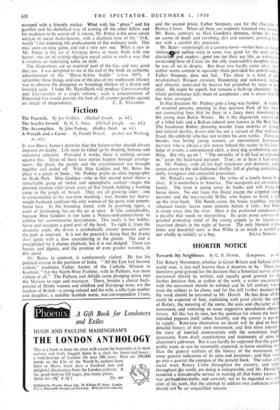Fict ion
8s. 6d.) IT was Henry James's doctrine that the fiction-writer should always improve on reality. Life must be tidied up by shaping, balance and unnatural selection. Provided it works, there is nothing serious against this. Three of these four stories happen through arrange- ment ; the place, the people and the circumstances are brought together and sealed off. With Miss Godden and Mr. Bates the place is a patch of India ; Mr. Pudney grafts an alien topography on Hyde Park. Miss Godden—who in this second novel shows a remarkable grasp of verbal and atmospheric control—stages the planned reunion after seven years of five friends holding a hunting camp in the jungle of Assam. They Are all growing older ; one is unreconciled to his war-time maiming ; two, besides her heavy- weight husband, confront the only woman of the party with remem- bered love. In the brooding forest, with its prowling tigers, a scent of foreboding lies on the air at once. It lifts, considerably, because Miss Godden is too keen a Nature-and-animal-lover to subdue her commonsense descriptions. This really is her hobby- horse and occupies a good part of the book. To right it, from the dramatic angle, she drives a symbolically sinister peacock across the path at intervals. It is not the peacock's doing that the drama does ignite with a slow smouldering in the gloom. The end is precipitated by a chance elephant, but it is not dodged. There are beauty and dignity, and the promise of even greater sureness, in this novel.
Mr. Bates, in contrast, is continuously violent. He has his political excuse in the partition of India. " All the East had become violent," meditates Father ' Anstey of the Catholic Mission in Kashmir, " but the North-West Frontier, with its Pathans, was most violent of all." The Pathans and Afridis come plunging down into the Mission to rape and massacre. There, besides a choral back- ground of Hindu women and children and European nuns, are the nucleus of British—a young colonel and his wife, a silly-type mother and daughter, a sensible Scottish nurse, war-correspondent Crane,
and the second priest, Father Simpson, cast for the character a Perfect Clown. When all these are suddenly knocked into disaster Mr. Bates, contrary to Miss Godden's dimness, shines Ilk to on scenes of death and ravishing, dirt and sickness, pointing th; out with a careful dry precision.
Mr. Bates—surprisingly in a country-lover—writes here as thoLg violenctibpd sadism were in some way good for the souls of L. character. and readers ; good too for their sex life, as witness th awakening love of Crane for the silly mem-sahib's daughter who he was all set to despise But these two hardly come alive : thzi author seems content to squander them provided his central oddity Father Simpson, does not fail. This cleric is a kind of pr revolutionary Russian creation, blundering and awkward, tactic- and obscene, motivated by heaven but propelled by imps of rai chief. He might he superb, but remains a built-up character. T whole performance falls short of acceptance ; one is aware that I; has been arranged.
In that direction Mr. Pudney goes a long way further. A number of assorted persons, meeting in that spurious Park of his, throw out connecting lines that tie them in a fancy story dominated by the young man Robin Winter. He is the degenerate natural son of a titled lady and a Balkan colonel now known as the Bird Man. The handsome Robin, planning murder from motives of revenge and natural devilry, draws into his net a variant of that well-worn fraud, the celebrity who has not written his own works. There are, besides, two loving young women, an intermittent first-person narrator who is always a few moves behind the reader in his knos ledge of events, a conventional clerk, a dead dog symbolising some thing. But why go on ? " The unreality of it all had so engrosses us," gasps the backward narrator. True ; or at least it had strut. us. Mr. Pudney, with all his high intentions and dexterity, really comes down to the old-fashioned thriller full of glaring coincidence shifty foreigners and concealed paternities.
Mr. Wetzel's way is different. He writes of a lonely house by river. It is somewhere in America. The occupants are an ordinar family. The river is eating away its banks and will bring th house down. No one faces this threat except the crippled youn narrator and the ten-year-old Willie, who begins to build a wal up the river-bank. The floods come, the house trembles, and the reluctant family leaves some minutes before it falls ; but Willie, is swept away into the river. Here is the profound simpleness of a parable that needs no interpreting Its quiet prose conveys the puzzled protesting mind of the young cripple as he focuses on recurrent details in the night of horror The only blemish in this bitter and beautiful story is that Willie is so much a symbol as






































 Previous page
Previous page